#the broadway melody
Text
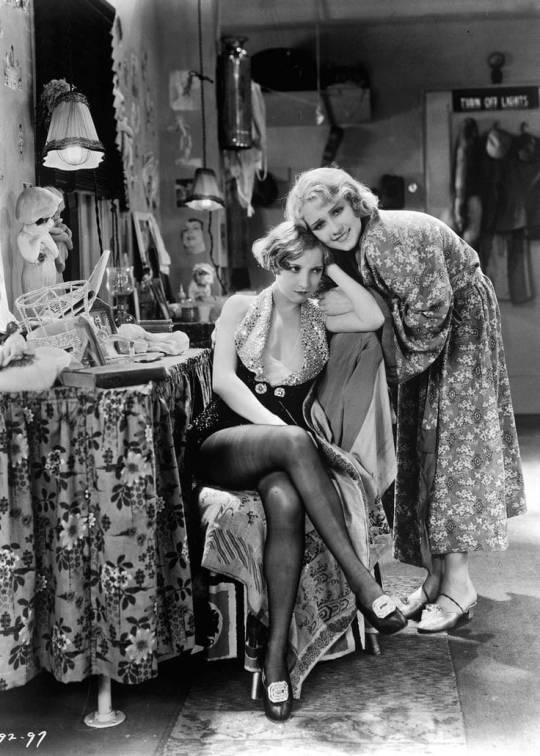
Bessie Love and Anita Page in The Broadway Melody 1929
#vintage#beauty#actress#hollywood#classic beauty#classic actress#classic cinema#classic film#classic hollywood#classic movies#the broadway melody#anita page#bessie love#1929
51 notes
·
View notes
Text

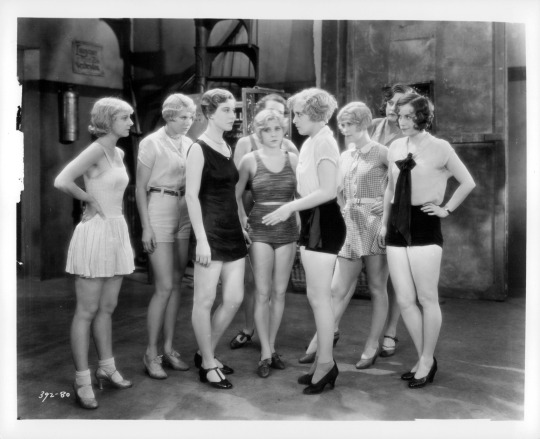

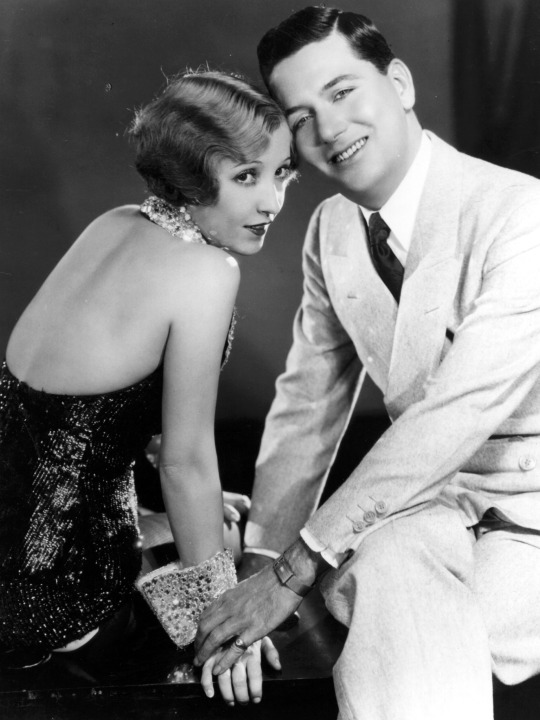
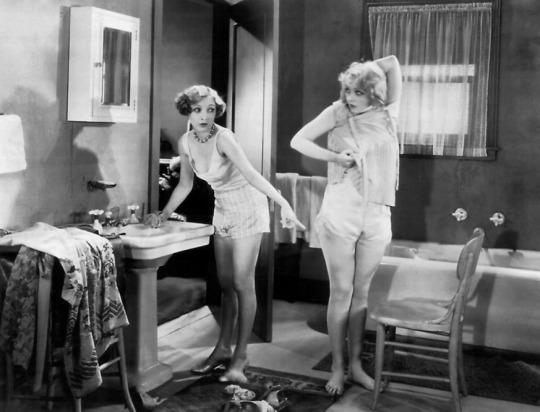

Harry Beaumont’s THE BROADWAY MELODY premiered in Los Angeles 95 years ago today (1929). This was MGM's first all-talking picture, and the first sound film to win the Best Picture Oscar. #OnThisDay
Stars: Charles King, Anita Page, Bessie Love
20 notes
·
View notes
Text
The top two vote-getters will move on to the next round!
#best best picture tournament#oscars#academy awards#best picture#the godfather#the broadway melody#million dollar baby#west side story#ben hur#how green was my valley#francis ford coppola#clint eastwood#jerome robbins#robert wise#john ford#poll#polls#bracket tournament#bracket#brackets
3 notes
·
View notes
Photo

11 notes
·
View notes
Text
crowd vs. critic single take // THE LOST WEEKEND (1945)
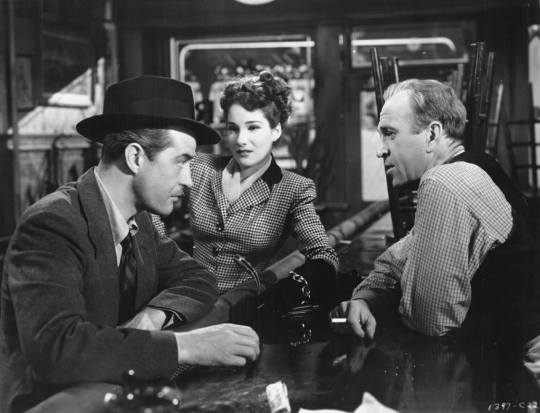
Photo Credits: IMDb.com
What’s one weekend away? For an alcoholic, torture.
Struggling writer Don (Ray Milland) is dreading a trip with his brother Wick (Phillip Terry), who monitors what he imbibes. He keeps a covert stash in the crannies of their New York City apartment, but it won’t be easy to sneak it out of town alongside his brother and his girlfriend Helen (Jane Wyman). Part belligerence and part willful ignorance convinces him perhaps it’s best not to go at all. A weekend spent only with himself—and a few fellow bar patrons—would be better.

CROWD // One of the reasons I love movies is they’re the closest to time travel we’ll ever get. Like Harry Potter dunking his head into the Pensieve, a screen always reveals more than the filmmakers intended because it's a literal portal into the past. The Lost Weekend’s portrayal of alcoholism feels melodramatic today, borderline heavy-handed, but in 1945, The New York Daily News called it "the most daring film that ever came out of Hollywood.” Turner Classic Movies notes it had a special relevance in a year when soldiers were returning from a traumatizing war, and it was “the first to treat drinking seriously and not play it for laughs. Gone were the inebriated Nick and Nora Charles of The Thin Man movies.” Just a few years later in 1949, Gone With the Wind author Margaret Mitchell died when she was was hit by a drunk driver. When Malcolm Gladwell explored it on his podcast Revisionist History, he observed, “The fact that his drinking might have been the reason he was speeding somehow didn't seem to occur to many people... but in the mentality of the time, the driver was irrelevant. He was as unlucky as the victim." All that to say, how we feel about alcoholism has changed in the last eight decades.
Though the context feels foreign today, the characters do not. If you’ve ever known someone struggling with crippling mental health issues, watching Helen and Wick waffle between support for Don and total exasperation will feel too familiar. You’ll also recognize the truth in Don’s statement that there are two versions of himself—the one who would love to be a writer, and the one who believes he’s a failure. One version wants to be the man Helen deserves and a responsible brother who pays the rent, but the other cons and manipulates them, even swiping the maid’s paycheck for his habit. (Writer/director Billy Wilder would create another unstable, manipulative character in Sunset Blvd., but Norma Desmond would add a sinister edge.) Even if The Lost Weekend doesn’t feel congruent with modern depictions of substance abuse, it’s still moving because its heart is empathetic to those struggling as well as their friends and family.
POPCORN POTENTIAL: 7/10

CRITIC // That success is largely thanks to the cast. In another film, Don could have been a villain or comic relief—here is treated with as much care as Milland took in preparing for the role. His commitment is an early example of the strategy many Best Actor hopefuls still take today, volunteering a physical transformation to become this character. In addition to changing his diet to lose weight, he took the initiative to stay in Bellevue Hospital for a time (where some of the film was shot, though Bellevue later regretted it) to experience their treatment of alcoholics. Though he was unsuccessful at achieving drunkenness, he was successfully mistaken as public day drinker by acquaintances who were gracious enough to mention it to the press. Without Milland, Matthew McConaughey might have still lost weight for Dallas Buyers Club, Brendan Fraser might still have gained weight for The Whale, and Leonardo DiCaprio might still have gone through the tortures of The Revenant, but perhaps Milland's win is the source code for actors going to extremes to show commitment to their craft.
In addition to nominations for editing and cinematography, Billy Wilder won his first Oscars for writing and directing The Lost Weekend. (He’d already lost five times, including for Ninotchka and Double Indemnity, and he’d win four more for Sunset Blvd. and The Apartment. Yeesh, what a career!) A Best Score nod brought to the tally to 7 total nominations, though that’s less impressive when you know the Academy recognized 47 nominees in 3 different music categories for the year of 1945. (The following year each category was narrowed down to the traditional five.)
One more indicator of the Ghost of Oscars Yet to Come: The Lost Weekend is the first social issues drama to win Best Picture. Previous winners danced around what is now a staple during Awards Season, but Sunrise: A Song of Two Humans and Grand Hotel were really slice-of-life character dramas, The Broadway Melody and Going My Way were really musicals, and It Happened One Night and You Can't Take It With You were really comedies, although all six of those titles were conscious of money, class, marriage, and religion. The Lost Weekend is the first winner about everyday people facing a present day challenge not set during war or a historical period. For the first time, the Academy affirmed the value of a "small" story with its highest honor, giving dignity to people and concerns that could be mistaken as unimportant.
ARTISTIC TASTE: 9/10
#The Lost Weekend#1945#Best Picture Project#Best Picture#Academy Awards#Oscars#Ray Milland#Billy Wilder#Jane Wyman#Phillip Terry#Doris Dowling#7/10#Crowd#Critic#Single Take#Harry Potter#Sunset Blvd.#The Thin Man#Margaret Mitchell#Malcolm Gladwell#Revisionist History#Gone With the Wind#Matthew McConaughey#Dallas Buyers Club#Leonardo DiCaprio#The Revenant#Brendan Fraser#The Whale#The Broadway Melody#Grand Hotel
0 notes
Text


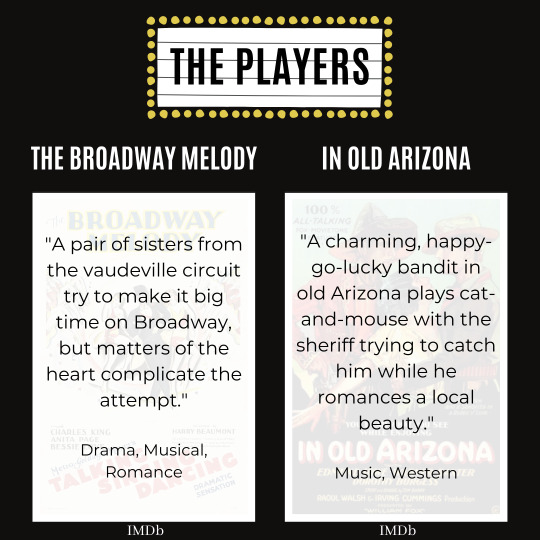

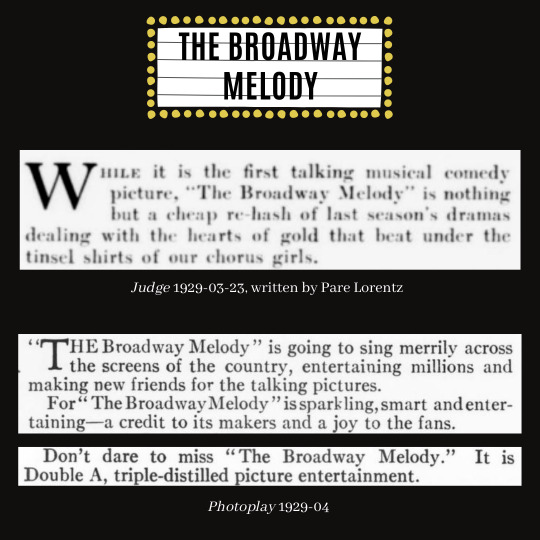

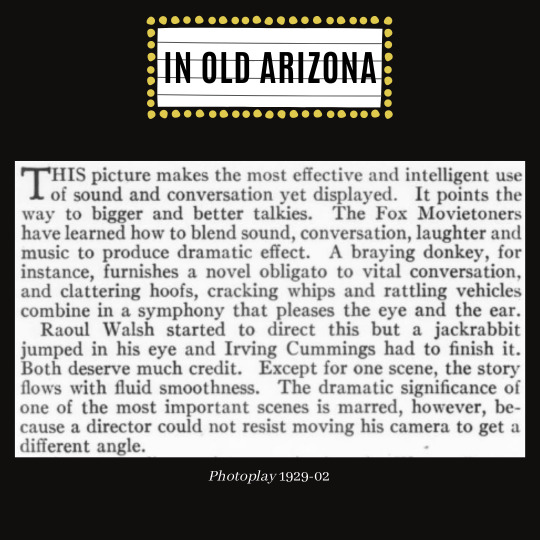
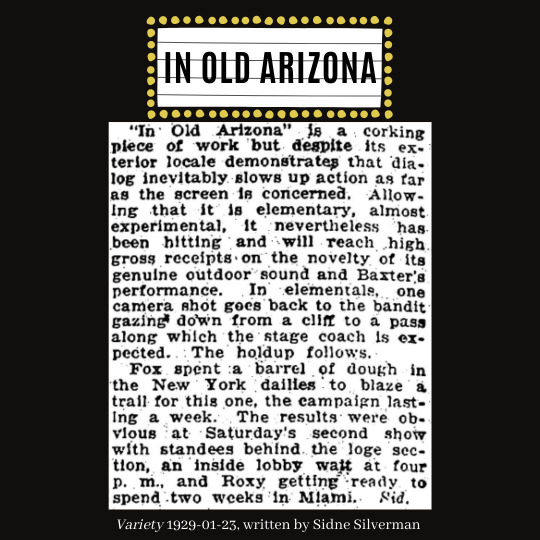
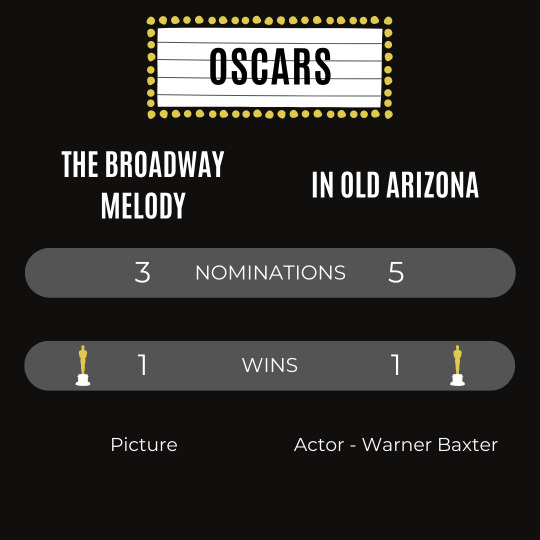
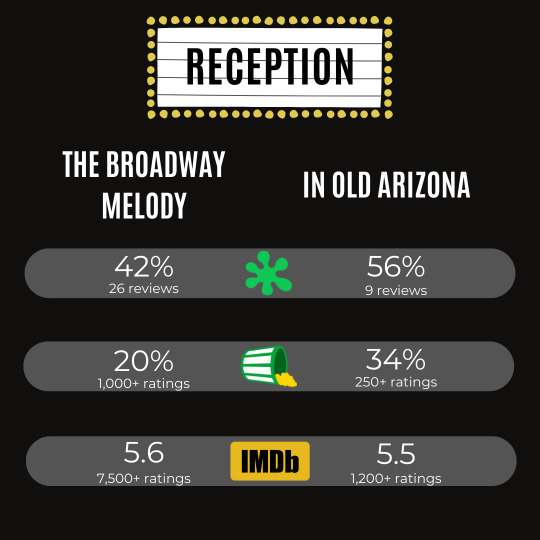

The match-up for the 2nd Academy Awards was between The Broadway Melody, a romantic musical, and In Old Arizona, a western.
We've transitioned out of the silent film era, and these first few talking films don't hold up as well to the test of time, sadly.
The Broadway Melody was praised for being the "first talking musical comedy" with a perfect mix of visual effects and emotions. It also brought in a significant amount of money for MGM with a relatively small budget. However, Pare Lorentz of Judge warned viewers that it lacked a unique story.
I could not find budget info for In Old Arizona, but Fox was known for producing low to mid-range budget films at the time, including 1st Academy Award winner Sunrise. It received great praise from Photoplay and Variety, especially for its sound. Variety briefly mentions that the dialog interferes with the action, but clearly that did not stop people from coming out in droves to see it.
Current reception for these two films is, well, poor. Both films were groundbreaking for the time - The Broadway Melody for including singing and dancing, and In Old Arizona for its outdoor filming - but that's about it. Critics and the general audience describe The Broadway Melody's plot as a poor attempt at pulling together the musical numbers. Similarly, they find it difficult to get through In Old Arizona's poor plot and stereotyping.
There were 7 categories awarded in the 2nd Oscars ceremony, still with no official nominees. In the end, 7 films all received one Oscar each, the only time that has occurred. So far, the two upsets have received nominations for both Directing and Writing (screenplay), while the winners have not. These two are often used as current predictors. Both upsets have also beat the winner in total overall nominations.
I found The Broadway Melody difficult to get through, even at only 100 minutes long. The actual story line was muddled, and it relied too heavily on musical numbers. But hey, it was the first movie to do so!
In Old Arizona was also quite basic. It lasted 95 minutes but the entire plot was easily summed up by IMDb into one line. The dialog was also incredibly difficult to hear due to poor sound mixing and not speaking TOWARDS the camera! Oh well.
Not surprisingly, neither film took home the Photoplay Award at the time. Only In Old Arizona remains in the Academy Film Archive.
#oscars#oscars95#academy awards#2nd academy awards#pre code film#film#movies#1920s film#1920s#the broadway melody 1929#the broadway melody#in old arizona 1928#in old arizona#oscarupsets
0 notes
Text


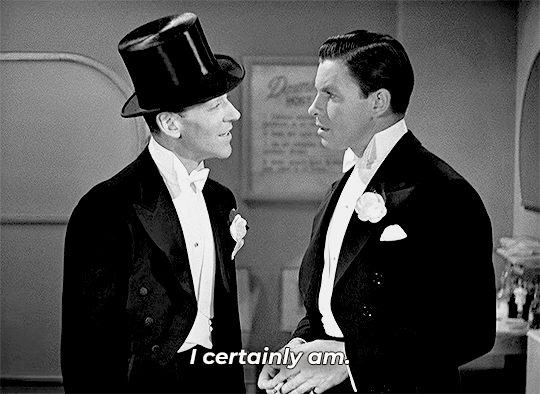
Fred Astaire
BROADWAY MELODY OF 1940 (1940) dir. Norman Taurog
#classicfilmedit#classicfilmblr#bigscreensource#filmgifs#fred astaire#broadway melody of 1940#1940s#George Murphy#Norman Taurog#1940#film#old hollywood#movie musicals#classic musicals#musicals#my gifs#my edits#filmedit#moviegifs#classic hollywood#movieedits
105 notes
·
View notes
Photo

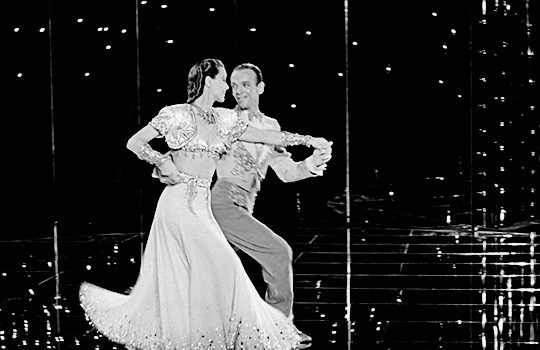

eleanor powell & fred astaire in broadway melody of 1940 (1940)
#filmedit#oldhollywoodedit#classicfilmedit#musicaledit#classicfilmblr#fyeahmovies#filmgifs#moviegifs#classicfilmsource#cinemaspast#fred astaire#eleanor powell#old hollywood#broadway melody of 1940#1940s#1940#norman taurog#dancing#m: broadway melody of 1940 (1940)#*#*gifs#bw#1k
2K notes
·
View notes
Text
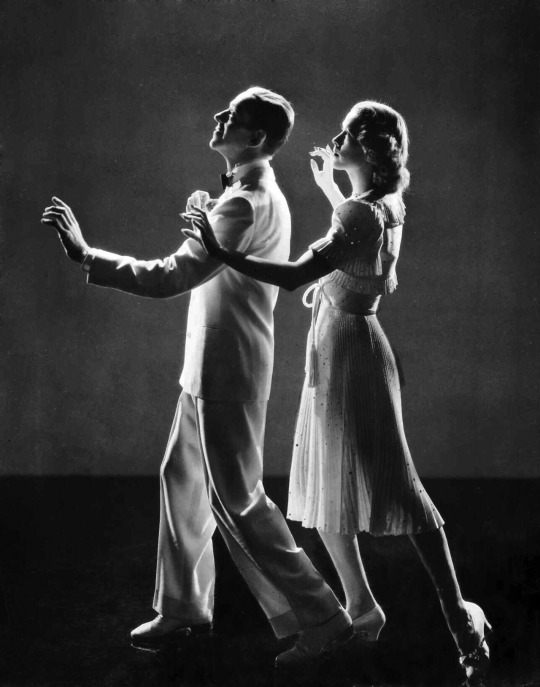
36 notes
·
View notes
Photo







eleanor powell in broadway melody of 1938
155 notes
·
View notes
Text

Bessie Love and Anita Page, The Broadway Melody 1929
#vintage#beauty#actress#hollywood#silent film#silent movies#silent era#classic actress#classic beauty#classic hollywood#classic movies#bessie love#anita page#1929#the broadway melody
48 notes
·
View notes
Text




Harry Beaumont’s THE BROADWAY MELODY hit theaters #Onthisday in 1929. This was MGM's first all-talking picture, and the first sound film to win the Best Picture Oscar.
13 notes
·
View notes
Text


Characters by @middlepath
#dark empath#original broadway trauma crew#no escape#melody bloom#molly maven#original characters#tea stuff#my art
18 notes
·
View notes
Text



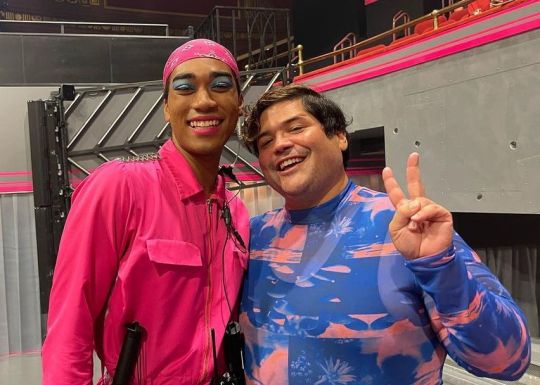


Ten years after his first time, Harvey saw Here Lies Love again, starring his friend Melody Butiu!
#harvey guillén#harvey guillen#melody butiu#sherry cola#bryan cranston#moses villarama#ashitaka porter#here lies love#here lies love broadway#musical theatre#september 2023
36 notes
·
View notes
Text
The bit in Doubt Comes In where the fates go "doubt comes in / and meets a stranger / walking on a road alone" goes crazy because not only does calling Orpheus a stranger highlight the isolation and unfamiliarity of his trial but he's also literally a stranger to doubt. He had never experienced the type of real tangible failure that losing Eurydice was, and he took a valuable lesson on pragmatism from it but he also learned FEAR, that things can and will go wrong. So when he encounters doubt for the first time he can't maintain his formerly unchallenged optimism, because he never had to persist fully aware of the possibility of failure before.
#hadestown#i understand that the album Doubt Comes In has a stronger atmosphere than the broadway version#but i can't really get behind people saying the Broadway one is an objective downgrade when the fates have so many amazing lyrics#and orpheus starting to repeat the fates' words and melody? even when they aren't singing anymore?#indicating how he has internalized their worst case scenario and premature horror/dread as his own beliefs??#stunning#like sure the instrumental is beautiful in the 2006 version#but have you considered “i used to see the way the world could be / but now the way it is is all i see and WHERE IS SHE”
13 notes
·
View notes
Text

"Ready set, let's-!"
#mlaatr#my life as a teenage robot#beetlejuice#fanart#nicktoon#rob renzetti#robot#smytus#brad carbunkle#melody#AU#artist on tumblr#cartoon#digitalart#nickelodeon#myart#halloween#broadway
42 notes
·
View notes